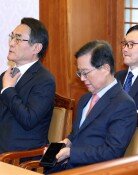Constitutional court’s dismissal of Seoul-Tokyo deal petition
Constitutional court’s dismissal of Seoul-Tokyo deal petition
Posted December. 28, 2019 08:00,
Updated December. 28, 2019 08:00
The Constitutional Court of South Korea on Friday rejected a petition to review the government’s deal with Japan on the issue of sexual enslavement in 2015. Lawyers for a Democratic Society (Minbyun) had filed the appeal with the victims and the family members of the deceased comfort women that the agreement which claimed to “finally and irreversibly” resolve the issue infringed the basic rights of the victims. The South Korean Ministry of Foreign Affairs on Friday claimed that the deal was not a legally binding treaty but a diplomatic agreement, and the court has finally taken its side.
Back in 2015, the then Park Geun-hye government signed a deal with Tokyo to acknowledge the responsibility of the Japanese government and to establish a foundation dedicated to supporting surviving victims with 1 billion yen (around 10 billion won) contributed by Japan. Yet, the Moon Jae-in government dismissed the deal and disbanded the foundation last year, while not officially invalidating the agreement itself. Japan has been continuously urging South Korea to faithfully implement the 2015 deal.
The court’s latest decision is meaningful in that the judicial authority has refrained itself from intervening in a diplomatic agreement. While saying that the deal is a political one made in the process of diplomatic negotiations, however, the court judged that the agreement did not affect the victims’ right to seek compensation or the government’s rights to protect. As it judged, the 2015 Seoul-Tokyo deal is not legally binding. Yet, not all diplomatic agreements need to be signed into a treaty. It is worrisome that the court’s decision to downgrade diplomatic agreements to simple political deals would affect the country’s future negotiations for diplomatic agreements.
In fact, it was the Constitutional Court’s another decision in 2011 that made the previous Park Geun-hye administration hasten to reach a deal on the matter with Japan in 2015. Back then, the court ruled that the government’s leaving the issue of comfort women unresolved would constitute nonfeasance which means it failed to perform its obligation. That drove the Park government to speed up the process of reaching an agreement with Japan, resulting in the dishonorable deal. The government should have put receiving apologies first rather than receiving compensation, but the court’s decision restricted the room for the government to negotiate diplomatically. It is hoped that the court’s Friday decision could serve as a chance to reflect on the distinct characteristics of diplomacy.







